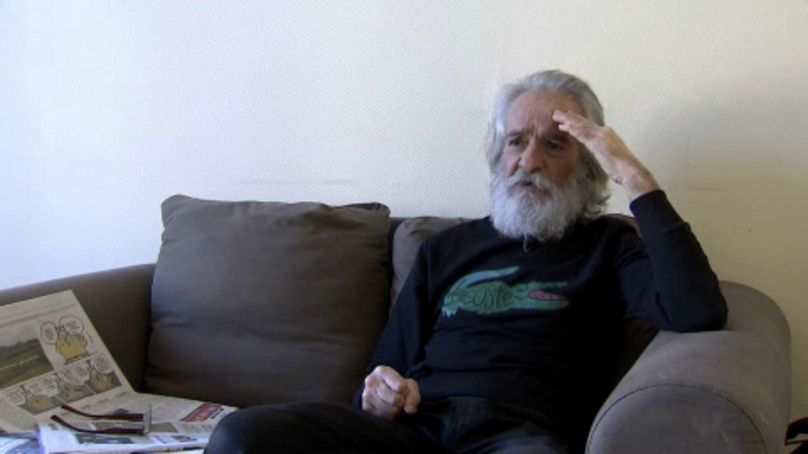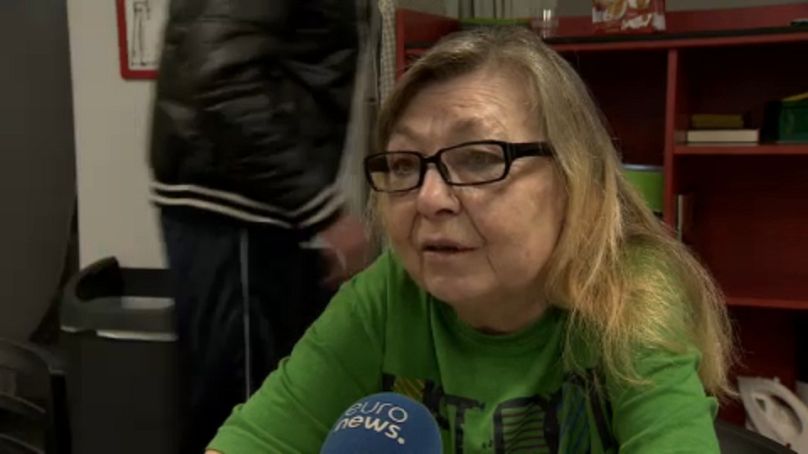The official number of homeless people in Europe is not known, their lives a hidden figure. The invisibility of this crisis in the EU flags up policy failures after years of austerity, stagnating wages and increase in house prices. We take a look behind the numbers.
Kamel Bouzebra is enjoying living this apartment in the Schaarbeek district of Brussels, after more than 15 years sleeping on the streets of the Belgian capital.
He moved in last October and told Euronews it's been a very different winter in is own home.
"Of course, you get up in the morning, you make your coffee, I have the radio for the news, a little music, the time to think about what will follow in the day", he says, relieved for having a calmer life at 64 years old.
Kamel is one of the beneficiaries of the "400Rooftops" campaign, which aims to find stable houses for 400 homeless people by 2020.
The government of the Brussels Capital Region and seven non-governmental organizations (NGO) are part of a international project promoting housing as a first tool for social reintegration.
"I have the allowance of the CPAS, the rent is 610 euros, plus the charges for the energy. Calculate, there is 700 euros per month. I thought: "Kamel is expensive". But as I lived in the street, I said, "Kamel, that's it or to go back to the street." In the morning, I get up and if I have to go to eat in a social canteen or to look for places where I can eat for free, I move and I go there", he explains.
Rising housing costs are a growing problem in Europe. According to a 2019 report about housing insecurity presented by FEANTSA (European Federation of National Organisations working with the Homeless), in Brussels, on the 22nd march, the so called overburden is one of the major challenges.
Overburden affects mainly the poor households
Overburden is when a household spends more than 40% of its income on housing costs.
In the EU, it affects 10% of general households and 40% of poorer households.
In poorer households in Greece, average overburden stands at 72 per cent of monthly income. But richer member states like Denmark aren't immune with overburden at 60 per cent of the monthly income - and in Germany, the average is 48 per cent.
Brussels is trying to tackle the problem of costly, poor quality, overcrowded or temporary lodging by building housing estates like this one.
The Tivoli project is being developed by the Brussels Regional government. Tucked between the poorer district of Molenbeek and the posher area of Laeken, it will soon welcome new residents.
"In many European countries, housing expenses are growing faster then the incomes and taking a big slice of families budgets. In this project, in Brussels, 70 per cent of the houses are for conventional rent, but 30 per cent are for social renting. Many experts say that there is a need to invest more in social housing so that houses are perceived not as a financial product but as a human right", explains Euronews correspondent in Brussels, Isabel Marques da Silva.
The "400Rooftops" campaign also proposes a more intermediate solution: low-cost modular units that are temporarily installed on undeveloped land.
The founder of HuNeeds, an NGO working with the homeless, says these movable studios can be financed by private investors and public authorities.
"People are getting more excluded from housing.This solution allows for more affordable housing, it allows to get people out of the street, so they re-adapt to a new daily life, taking the necessary administrative steps to have greater access to the permanent housing", Nastasia Englebert.
How many homeless people in the EU?
Ryszarda is still living in the streets. Early in the morning, twice a week, she goes to La Fontaine to get hygiene and nursing care. It's a project managed by the Order of Malta christian charity,.
After 15 years working as a cleaning lady without a contract, she found herself homeless five years ago.
"Not all employers agree to make contracts. I had a last job, also without contract, that allowed me to take a flat and I paid the rent. I do not have the flat anymore because I'm sick. I need a small apartment, it does not matter if it is upstairs or in the cellar, but not expensive. Here all is very expensive", Ryszarda tells Euronews.
There is no data about the exact number of homeless people across the EU. National figures are collected using different methods, and in different years, but especially in countries like Ireland, Luxembourg and Belgium they point to a sharp rise in street sleeping after the economic crisis.
Providing increased capacity of better quality, emergency shelter is one of the main messages in the FEANTSA report.
It recommends that although housing is a national competence, the EU institutions should be working to highlight the problem and to find solutions.
"The European Commission should collect data on homelessness. It is challenging but it is not impossible and it could already do lot more with the national data that exists. Hidden homelessness, rough sleeping (situations) and people staying in emergency accommodation is really the tip of the iceberg. Homelessness is touching young people, that are particularly at risk, migrants in different situations, and women and children, all families, are increasingly affected by homelessness in Europe", says Ruth Owen, policy coordinator.
Finland is the only Member State where homelessness has been steadily decreasing for the last two decades, after creating a Housing First policy. But elsewhere in the EU it is a growing problem which will need to be solved.













